AUGUST AND BEYOND

Brian Evenson, The Glassy, Burning Floor of Hell, Coffee House Press (August 3)
Evenson is one of our greatest contemporary writers of literary horror; I’m always psyched—and a little afraid—when he has a new book out. According to the publisher, his latest collection “envisions a chilling future beyond the Anthropocene that forces excruciating decisions about survival and self-sacrifice in the face of toxic air and a natural world torn between revenge and regeneration.” Gah, and also: give it. –ET
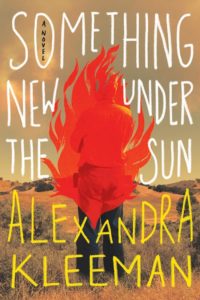
Alexandra Kleeman, Something New Under the Sun, Hogarth (August 3)
Hell yes: I am 100 percent here for a new Alexandra Kleeman novel; five years after its publication, I think about You Too Can Have a Body Like Mine once a week, minimum. Something New Under the Sun sends a novelist to a near-future Los Angeles in which all the rich people drink synthetic water and, according to the publicity copy, “grapples with the corruption of our environment in the age of alternative facts . . . with a meticulous and deeply felt accounting of our very human anxieties, liabilities, dependencies, and, ultimately, our responsibility to truth.” That tracks, and I can’t wait. –ET

Anthony Veasna So, Afterparties, Ecco (August 3)
We’ve known that Afterparties, a “history-haunted comedy of Cambodian-American manners,” was going to be one of the biggest short story collections of 2021 for a while now, and you might remember So’s story, “Three Women of Chuck’s Donuts,” which was published in the New Yorker in February 2020. So tragically died in December; he was just 28. All we can do now is read his work and celebrate his life. –ET
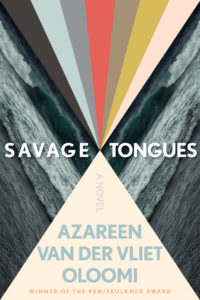
Azareen Van Der Vliet Oloomi, Savage Tongues, Houghton Mifflin (August 3)
Azareen Van Der Vliet Oloomi is no stranger to accolades: a PEN/Faulkner Award winner, a Whiting Award winner, and one of the National Book Foundation’s coveted 5 Under 35?! And, boy oh boy, does she deserve every one of them. I will be anticipating anything she writes. In this case, it’s a novel about an Iranian American teenager who goes abroad to meet her estranged father. Instead, she finds money and instructions to help care for Omar, a forty-year-old man. Instead, she finds an affair that has a hold on her years after its end. Savage Tongues has drawn comparisons to Shirley Jackson and Samanta Schweblin for the way it keeps you suspended in a state of discomfort and hauntingly depicts a shattering of the self. –KY
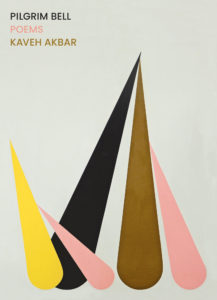
Kaveh Akbar, Pilgrim Bell, Graywolf (August 3)
Every Kaveh Akbar poem feels like a new beginning in a world where they tend to be in short supply; his work is a reminder of grace, of the endless questions that define life and faith, and, most of all, of astonishment. Pilgrim Bell, which follows the 2017 collection Calling a Wolf a Wolf, opens a path of interrogation into the self as it encounters the divine—and encounters the many human-made structures that would dissolve it. It’s a privilege to be a witness to this journey. –CS

Rita Dove, Playlist for the Apocalypse: Poems, W. W. Norton (August 3)
This is a major event: the first collection of poems from Rita Dove—Pulitzer Prize winner, former US Poet Laureate—in 12 years. That’s right: New Rita Dove. Described as “audaciously playful yet grave, alternating poignant meditations on mortality and acerbic observations of injustice . . . [taking] us from the smallest moments of redemption to apocalyptic failures of the human soul,” it sounds like it will have been worth the wait. –ET
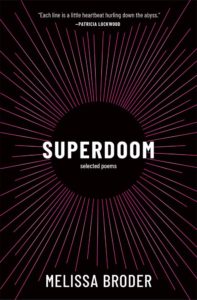
Melissa Broder, Superdoom: Selected Poems, Tin House (August 10)
Said Melissa Broder to Vanity Fair in 2016, “Emily Dickinson would have been great at Twitter,” and Broder herself is evidence. Broder is the face behind the popular Twitter account @sosadtoday, and her poetry has a poster’s concision and punch, leaping from God to lust to the grotesquerie of mortal bodies all in the same few lines. Superdoom features work from Broder’s three out-of-print poetry collections, as well as her fourth and most well-known collection, Last Sext. It’s a greatest hits collection by someone whose hits just keep coming. –WC
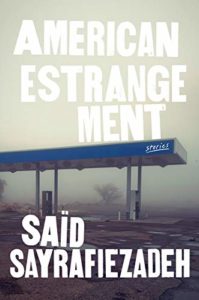
Saïd Sayrafiezadeh, American Estrangement: Stories, W. W. Norton (August 10)
I’ve been waiting for a new collection by Sayrafiezadeh since his excellent debut Brief Encounters with the Enemy, which he published back in 2013. I’m thrilled he’s back, with, as his publisher puts it, a “searing, intimate, often slyly funny,” collection,” a testament to our addled times.” –ET

Alice McDermott, What About the Baby? Some Thoughts on the Art of Fiction, FSG (August 17)
Aspiring writers (or successful ones, for that matter) would very much benefit from spending time with renowned novelist McDermott’s generous ideas about storytelling. Ranging from engaging tales of the writer’s life to more serious technical approaches unpacked with the conversational clarity of a lifelong teacher, What About the Baby? is a craft classic in the making. –JD

Ash Davidson, Damnation Spring, Scribner (August 17)
Damnation Grove is a logging town, always has been. But salmon are disappearing from creeks; mudslides are demolishing hillsides; miscarriage rates are rising. Midwife Colleen Gundersen suspects Sanderson Timber Company’s herbicides, but unraveling the mystery will threaten not just the town’s future but also her future with her husband (and Sanderson employee) Rich, who unbeknownst to her has spent their savings on more logging land in the hopes of giving their son a better life. Just reading the summary of Damnation Spring, I’m filled with dread and sadness—for Damnation Grove, and for all casualties of environmental degradation, past and future. –WC
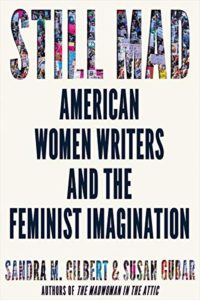
Sandra M. Gilbert and Susan Gubar, Still Mad: American Women Writers and the Feminist Imagination, W. W. Norton (August 17)
Literary critics Sandra M. Gilbert and Susan Gubar, authors of The Madwoman in the Attic, now look at the legacy of literary second wave feminists in Still Mad, which revisits work by Toni Morrison, Adrienne Rich, Ursula K. Le Guin, Maxine Hong Kingston, Gloria Anzaldúa, and others. They offer a valuable, and needed, reconsideration of the writers who provided a basis for further feminist thought, even as the movement, due to the work of Black feminists, expanded over the course of decades toward greater inclusivity. This is a great chance to revisit some of our most foundational writers and thinkers. –CS

Rafia Zakaria, Against White Feminism: Notes on Disruption, W. W. Norton (August 17)
“A white feminist is someone who refuses to consider the role that whiteness and the racial privilege attached to it have played,” Zakaria writes. And you do not have to be white to be a white feminist, she contends. This necessary book is a critique of how whiteness (not white women) has infiltrated feminism and how it should be razor-bladed out of the current form. What does this mean? Look around. Who are the feminists writing about feminism or the experts speaking about feminist policy or leading feminist organizations and what are their assumptions and goals? Do they acknowledge the disproportionate access and networks within their ranks? Zakaria’s critiques orbit her lived experience. For example, Zakaria grew up in Pakistan and saw the women in her life suffer and survive loss, discrimination, migration, and more without ever abandoning those who relied upon them. Part of the current feminist commandments don’t allow for such resilience (to stay rather than leave) and insist upon rebellion instead. Her argument is much more nuanced than my clumsy retelling but know this: Zakaria is a warm-hearted and sharp-eyed writer that brings compassion, intelligence, and a steady drumbeat of change to redefining term—feminism—a word that is old and soggy and full of white ladies yelling about things. This book is going to light fires everywhere, so if you are prone to combust, get right the hell out of the way. –KA
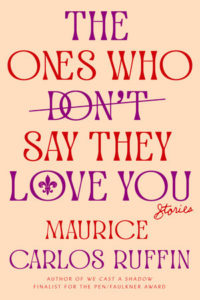
Maurice Carlos Ruffin, The Ones Who Don’t Say They Love You: Stories, One World (August 17)
Maurice Carlos Ruffin follows up on his darkly provocative, critically acclaimed debut novel, We Cast a Shadow, with this collection of stories set in and around his native New Orleans. The characters in Ruffin’s stories struggle, in their various ways, to navigate the depths of a great American city too often mythologized for its flamboyant surfaces. –JD
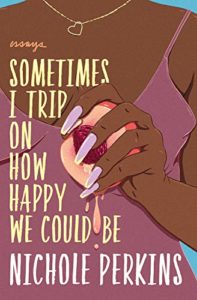
Nichole Perkins, Sometimes I Trip on How Happy We Could Be, Grand Central (August 17)
I love a memoir that takes pop culture as its launching point, both so I can read smart takes on things I’ve been obsessing over and to get briefed on things I’ve missed. To that end, my 2021 summer reading will happily include Nichole Perkins’s meditation on how twenty years of pop culture and the internet affected her psyche as a Black woman from the South. In case you need any more motivation to pre-order this one, it’s one of Roxane Gay’s picks for her new book club. –ES
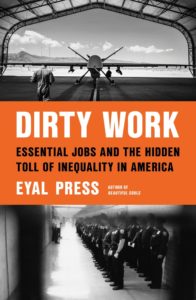
Eyal Press, Dirty Work: Essential Jobs and the Hidden Toll of Inequality in America, FSG (August 17)
It’s easy enough to cheer for essential workers like nurses or delivery drivers or grocery store shelvers (though paying them a fair wage is another thing)—but what about the workers who really make contemporary American capitalism hum? The guys on the kill floor at an industrial slaughterhouse? The penitentiary guards who keep the billion-dollar prison industrial complex bringing in the big bucks? As journalist Eyal Press reveals, these are the really dirty jobs that keep America going, at great personal cost to those doing them. Frankly, it’s just not worth it. –JD

Jaime Cortez, Gordo, Black Cat (August 17)
Gordo is the Winesburg, Ohio of the 21st century—but instead of revealing mid-America of the 1910s, Cortez plumbs the lives of those living in a migrant labor camp in California in the 1970s through the eyes of Gordo, “a fat, precocious nine-year-old sissy boy” (his words, not mine: Litquake 2019). “The Jesus Donut” launches this book like a missile. A man who looks like “Mr. Kentucky Fried Chicken” shows up at Gyrich Farms Worker Camp (the name, Guy-rich, indicates Cortez’s parodic sensibilities) with a van full of donuts for sale, amid five kids, including our narrator, Gordo. Thing is, nobody has a cent. That is until Olga pulls a quarter from her dirty sneaker and buys two for twenty cents. “Body of Christ” says Olga as she raises a donut piece to each kneeling kid (something she insists they do for their reward) and they respond, “Amen” in an impromptu, forced communion. I nearly fell off my chair laughing. Cortez’s dialogue, timing, and humor is quick, dark, and hilarious and the voice of Gordo, singular and soaring, full of naïveté and grit that wrangles humor and human complexity with serious high stakes themes, for in the background, migrant workers carry burdens many of us don’t. While I’ve only read two chapters, I can tell Gordo, like Winesburg, Ohio, is capable of changing not only what it means to be American today, but what American literature can be; that of giving voice to the periphery. Hands down, top debut of 2021. –KA
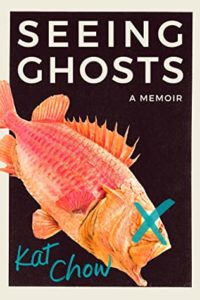
Kat Chow, Seeing Ghosts: A Memoir, Grand Central (August 24)
Kat Chow’s reporting, most recently as a founder of NPR’s Code Switch podcast, has often looked at the ways that cultural identity influences our daily lives and our encounters with institutional power. Now, she turns her focus to the story of her own family—from their roots in China and Hong Kong to their homes in Cuba and the U.S.—and the intergenerational experience of loss. –CS

Paula Hawkins, A Slow Fire Burning, Riverhead (August 31)
Hawkins is fascinated with liminal spaces, those areas that are concerned with travel, or transition. After her highly successful debut, The Girl in the Train, she then headed to the mashes for her sophomore novel, Into the Water, and now, in August’s upcoming release, Hawkins takes to the river with a murder on a houseboat. Three women have equal cause for revenge against the victim, and Hawkins eschews the usual red herrings to keep readers guessing till the end (that’s what I predict, anyway!). –MO

A.K. Blakemore, The Manningtree Witches, Catapult (August)
Rebecca West is a young woman at the margins—scraping by with her mother in a town whose men have been drained into war, doing laundry and needlework for the better off, obsessing over the hot clerk who gives her lessons. But that’s until the Witchfinder comes to town. Set during the 17th-century witch trials in Essex, and based on actual documents from the time, this is a riveting, unsettling story of menace and corruption. Blakemore is also a poet, with two published collections, and you can tell—the absolute fun she has with language in this novel is one of its greatest delights. Curses and descriptions are gilded in equal glory. I loved every minute, and even when I was horrified, I couldn’t look away. –ET

Maggie Nelson, On Freedom: Four Songs of Care and Constraint, Graywolf (September 7)
Maggie Nelson is one of the most important contemporary critics and also one of our most thrilling writers in almost every genre. A new work from her is always something to look forward to, but this one sounds particularly essential, examining the complex meanings behind the concept of freedom in “four distinct realms: art, sex, drugs, and climate.” According to the publicity copy, Nelson’s “abiding interest lies in ongoing “practices of freedom” by which we negotiate our interrelation with-indeed, our inseparability from-others, with all the care and constraint that relation entails, while accepting difference and conflict as integral to our communion.” Very much looking forward to this one. –ET

Lauren Groff, Matrix, Riverhead (September 7)
Listen, Lauren Groff has a new novel, and it’s about Marie de France! What else do you really need to know? (If you need to know more, I guess you can learn a little more here.) As for me, I’m set to smash that pre-order button right now. –ET

Colson Whitehead, Harlem Shuffle, Doubleday (September 14)
The latest novel from Whitehead, one of the most popular and important contemporary novelists, is “a gloriously entertaining novel of heists, shakedowns, and rip-offs” set in 1960s Harlem. The publicity copy calls it “a family saga masquerading as a crime novel, a hilarious morality play, a social novel about race and power, and ultimately a love letter to Harlem.” As a Whitehead completist, I’ll be first in line. –ET

Gayl Jones, Palmares, Beacon Press (September 14)
The first Gayl Jones book I ever read was Corregidora, and I was floored by the quiet force of the novel, which swelled with subtext and required a patient eye. So, I can’t begin to describe how excited I am for Jones’ long-awaited fifth novel, which is her first in 21 years. Palmares is set on the last of seven fugitive settlements in 17th-century colonial Brazil, weaving mythology and magical realism. Jones has been described as “one of the best American novelists whose name you may not know,” but you really want to know this writer and her upcoming book. –RS

Richard Powers, Bewilderment, W. W. Norton (September)
Damn, this is going to be a star-studded fall. It’s pretty impressive that Powers, who won the Pulitzer Prize in 2019 for The Overstory, already has another book, but I won’t complain. Bewilderment concerns Robbie, a neurodivergent 9-year-old boy on a quest to draw all of the animals on the edge of extinction, and his astrobiologist father, Theo. Robbie’s mother has just died, and the experimental treatment keeping him stable by connecting him to her just lost its funding. According to the publisher: “With its soaring descriptions of the natural world, tantalizing vision of life beyond it and the ferocious love of a father for his young son, Bewilderment marks Richard Powers’ most emotionally powerful novel to date. At its heart is the question: What is the world, at once perilous and imperiled, we’ve left for our children to inhabit, and can Theo save Robbie from it?” Yep, I’m already in my feelings. –ET

Jonathan Franzen, Crossroads: A Novel: A Key to All Mythologies, Volume 1, FSG (October 5)
Quelle title, amirite? Whatever your feelings about Franzen (I, your local snob, am weirdly agnostic), his books are always Major Publishing Events, and as such are worthy of your anticipation—either for happily reading or happily dunking on. Or both! In the meantime, here are some facts about it. See you in October. –ET

Jennifer Egan, The Thing That Changes Everything, Little, Brown (October 7)
All I know about the next Jennifer Egan novel is that it exists. But considering the book directly above this one, I have something else to anticipate . . . the literary rematch of the decade! Franzen has (probably) been waiting for this since 2011, when A Visit From the Goon Squad (rightly) trounced the (admittedly also pretty good) Freedom by winning both the Pulitzer and the National Book Critics Circle award. Egan has (probably) not been thinking about it at all. The stuff of legends, folks. –ET

Un-Su Kim, The Cabinet, Angry Robot (October 26)
I loved South Korean writer Un-Su Kim’s weird and wonderful The Plotters, which was translated into English in 2019 by Sora Kim-Russell, so I’m definitely looking forward to reading his debut, which won the Munhakdongne Novel Award when it was published in Korean in 2006. What is is about? Hard to say—but I suspect it’s one of those where you’re better off not knowing until you’re in it. –ET



